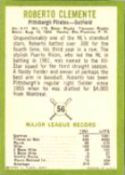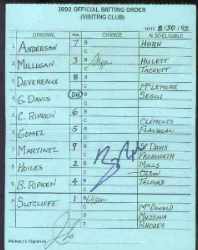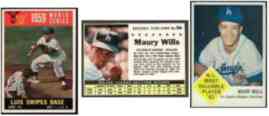1975 Topps #280 Carl Yastrzemski (Red Sox)


Please wander around the website for more info, prices, values & images
on vintage baseball, football, basketball, hockey, sport and non-sports cards.
Authentic Major League SIGNED |

Team Autographed / Signed Baseballs
Team signed baseballs were the thing well before single-signed
balls exploded on the market.
Click for our current
Autographed/Signed Team Baseball inventory
What is a "Team Signed Baseball" ??? Simple answer: A ball with XXX signatures of a certain team for a certain year. What is difficult is the XXX. Baseball tons of roster moves make it nearly impossible to "Get Them All". Generally, team signed baseballs from early 1900's had 10 to 15 signatures, the 1940's that jumped to 18 to 25. Joyce Sports Research Collection (Notre Dame) says "signatures must include only members of a specific team from a specific year, and there must be some approximation of completeness." Not concrete but to me a "team ball" MUST have ALL the team's STARS (unless a rookie or in season trade) and in today's market at least 20, preferably more, and the manager.
Determining Age of Team Signed Balls
Note: You may be on that page now. |



1963 Fleer Baseball Cards
|

O-Pee-Chee (OPC) based in Ontario Canada, is mostly thought of as the Canadian version of Topps but it actually pre-dates Topps by many years.
In 1933, OPC issued their first sports card set, the V304 Hockey cards and is currently in the tens of thousands. Their first baseball set was issued in 1937. It was similar to the 1934 Goudeys and Batter-Ups and the top player was Joe Dimaggio.
O-Pee-Chee created baseball card sets similar to TOpps from 1965 into the 1990's. At first OPC sets were much smaller than Topps and included just the first few series. Fronts & backs were nearly identical but with a small "Printed in Canada" on the back and the card stock was slightly different.
Baseball being much less popular in Canada, OPC print runs of their early years were between 1% and 10% of Topps making them exceedingly scarce !!!
Starting in 1970, Canadian legislation demanded all items produced in Canada
carry both French & English so OPC baseball cards became bilingual with both
languages included.
Other OPC differences include:
1971, OPC even changed the back design to a much more
interesting back and also offered 14 different card photos not in the Topps set.
1972 OPC included a card of Gil Hodges mentioning his death that was
not a part of the Topps set.
1974 OPC did not include any "Washington Nationals" variations.
1977 the card format remained like Topps but almost 1/3 of the OPC set had
different poses/images than Topps.
In late 1970's, OPC card fronts appeared similar to Topps but sometimes
included traded information saying "Now with XXXX". They were able to do
this as the OPC cards were printed much later into the season.
 These are the official lineup cards SIGNED BY THE MANAGER & given
to the home plate umpire before the game with the team's line-up
& batting order !!! Making them even neater, often managers made
lineup changes on these cards throughout the game.
These official lineup cards were SIGNED BY THE MANAGER and presented
to the home plate umpire before the game. They detailed the team's lineup and
batting order. Managers often made lineup changes on these cards throughout
the game, making them even more unique.
These are the official lineup cards SIGNED BY THE MANAGER & given
to the home plate umpire before the game with the team's line-up
& batting order !!! Making them even neater, often managers made
lineup changes on these cards throughout the game.
These official lineup cards were SIGNED BY THE MANAGER and presented
to the home plate umpire before the game. They detailed the team's lineup and
batting order. Managers often made lineup changes on these cards throughout
the game, making them even more unique.
 1963 Fleer baseball card set was cut short at 66 cards & checklist
by Topps lawsuit. But what 66 cards! Attractive & packed:
Clemente,Koufax... & 2 very scare Short Prints.
1963 Fleer baseball card set was cut short at 66 cards & checklist
by Topps lawsuit. But what 66 cards! Attractive & packed:
Clemente,Koufax... & 2 very scare Short Prints.  Maury Wills 'rookie' card is a story.
Majors in 1959, quickly superstar. But 1963 for rookie ???
In 1959 Topps deemed Wills NOT WORTHY.
Maury Wills 'rookie' card is a story.
Majors in 1959, quickly superstar. But 1963 for rookie ???
In 1959 Topps deemed Wills NOT WORTHY. 
 Wills was upset. After 1962 MVP, Topps came knocking but he said "NO!".
Finally, 1967, Wills first Topps & most costly card.
Note: 1961 Post Cereal card, years BEFORE
Wills was upset. After 1962 MVP, Topps came knocking but he said "NO!".
Finally, 1967, Wills first Topps & most costly card.
Note: 1961 Post Cereal card, years BEFORE
 'official' rookie. He also photo-bombed a 1960 Topps card.
'official' rookie. He also photo-bombed a 1960 Topps card. 